Dislocations occur when the bones forming a joint are forced out of their normal positions, causing intense pain and immobility. Shoulder, knee, and hip dislocations are among the most common types and can result from trauma, accidents, or sports injuries. These injuries require immediate medical attention to prevent complications such as nerve damage, ligament tears, or chronic instability. Germany is renowned for its advanced orthopedic care, offering cutting-edge treatments, innovative surgical techniques, and state-of-the-art rehabilitation programs for dislocated joints.
Dislocations can result from various factors, including:
Trauma or Accidents: Car crashes, falls, and direct blows to joints.
Sports Injuries: Common in contact sports like football, rugby, and basketball.
Repetitive Stress & Overuse: Can weaken ligaments and lead to instability.
Congenital Conditions: Some people have hypermobile joints prone to dislocations.
Obesity & High BMI: Excess weight puts stress on joints.
Weak Muscles & Ligaments: Lack of strength and flexibility increases the risk.
Types of Dislocations
Shoulder Dislocation
Most frequently dislocated joint.
Occurs when the upper arm bone (humerus) pops out of the shoulder socket.
Common in athletes, elderly individuals, and individuals with weak ligaments.
Knee Dislocation
Involves displacement of the patella (kneecap) or tibiofemoral (shinbone and thighbone) dislocation.
Can cause severe ligament damage.
Requires immediate treatment to prevent long-term mobility issues.
Hip Dislocation
Happens when the head of the femur moves out of the hip socket.
Usually results from high-impact trauma, such as car accidents.
May be posterior (backward) or anterior (forward) dislocation.
Risk Factors for Dislocations
Previous Dislocations: Increased susceptibility to recurrence.
Weak Ligaments & Joint Hypermobility: Genetic conditions like Ehlers-Danlos Syndrome increase risk.
Osteoporosis & Bone Weakness: Common in older adults.
Improper Training & Poor Technique: Increases chances of sports-related dislocations.
Autoimmune Diseases: Conditions affecting joint integrity and mobility.
Symptoms of Dislocations
Severe Pain & Swelling at the affected joint.
Visible Deformity or Out-of-Place Appearance.
Limited or Complete Loss of Movement.
Bruising & Tenderness Around the Joint.
Numbness or Tingling Sensation if nerves are affected.
Diagnosis & Diagnostic Tools
Germany's top orthopedic hospitals and specialists use advanced diagnostic methods, including:
Treatment of Dislocations in Germany
Immediate First Aid & Emergency Treatment
Non-Surgical Treatments
For mild to moderate cases, German specialists recommend:
Surgical Treatments
For severe or recurrent dislocations, Germany offers advanced orthopedic surgery, including:
Innovative Therapies for Dislocations in Germany
Germany leads in regenerative medicine and cutting-edge treatments, such as:
Why Choose Germany for Dislocation Treatment?
Solutions & Prevention of Dislocations
Preventive Measures
Complementary Therapies for Recovery
Conclusion
Dislocations of the shoulder, knee, and hip are painful and debilitating, but early intervention and proper treatment can restore mobility. Germany provides world-class orthopedic care, from non-surgical therapies to minimally invasive procedures and innovative regenerative treatments. With highly skilled specialists, state-of-the-art hospitals, and comprehensive rehabilitation programs, Germany remains a top destination for treating dislocations.
By following preventive strategies, individuals can reduce the risk of dislocations and maintain joint health and overall well-being.
👉 Contact us for further information and receive a complimentary consultation.


.webp)
 (1).webp)

.webp)
 (1).webp)


.webp)
 (1).webp)

.webp)
 (1).webp)
